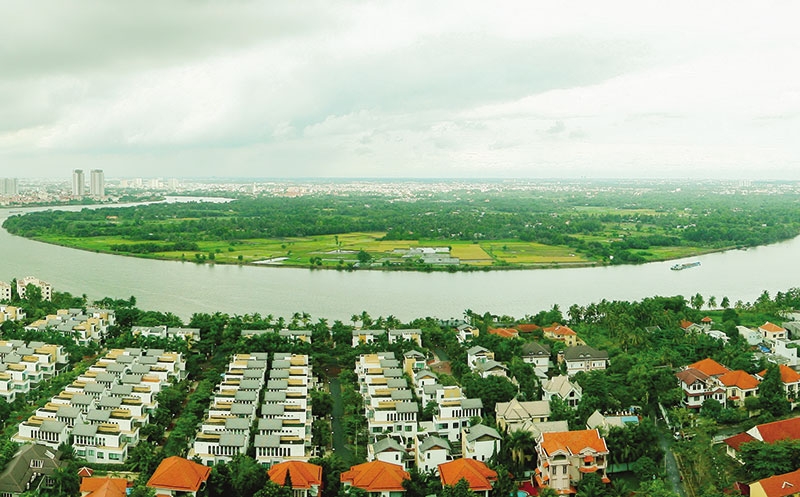Ho Chi Minh City revives stalled property projects
 |
| New life may soon be breathed into Ho Chi Minh City’s delayed urban development projects , Photo: Le Toan |
Last week, the Ho Chi Minh City People’s Committee assigned its Department of Planning and Investment to propose a plan to bring the Binh Quoi-Thanh Da Urban Area project, delayed more than 14 years, to the public in order to seek new investors.
According to the committee, this is a large-scale project with complicated clarifications, which could result in a lengthy selection period for new investors. In order to minimise the impact of delays, local residents of the urban area will be permitted to prepare and upgrade their houses, which have been degrading for many years.
To further avoid delays, the committee has instructed the local authorised agencies to look for investors with sound financial health.
In their proposal, the local authorised agencies must clarify the legal status and the reason for selecting any new investors. They must also present detailed qualifications of the investors and the selection process through which new investors were chosen. Incoming investors will also be expected to cover expenses for land clearance and compensation, and must have a legal guarantee from prestigious financial institutions.
The Binh Quoi-Thanh Da Urban Area project was awarded to Saigon Construction Company in 2004 as a site of 426 hectares in Binh Thanh district of Ho Chi Minh City. Due to this investor being unable to implement the project by 2010, the committee took it back and gave it to Bitexco, one of the leading multi-sector groups in Vietnam.
In 2015, Dubai’s Emaar Properties joined the project and the two firms planned to develop the $1.42 billion urban area. However, Emaar Properties pulled out of the project in 2017, claiming delays in land clearance and compensation issues as its reasons.
Binh Quoi-Thanh Da is only one of many projects in Ho Chi Minh City listed to be reviewed and for investment permissions to be withdrawn because of years of delays.
Nguyen Thanh Phong, Chairman of the Ho Chi Minh City People’s Committee, has requested the local Department for Natural Resources and the Environment to review plans for 85 real estate projects which have seen years of delays, mostly in Binh Chanh and Nha Be districts.
According to Phong, those projects were only the most prominent cases of a much longer list of 500 projects which have experienced lengthy delays in Ho Chi Minh City.
“Over the last five years, with strict punishment from the local authorities, more than 570 projects were withdrawn, totalling nearly 6,000ha of land,” Phong said at a recent meeting in Ho Chi Minh City to find solutions for delayed projects. “Of these, we have taken some land plots to auction to find new investors.”
The Ho Chi Minh City Department for Natural Resources and the Environment is also assigned to finish its plan to review and propose solutions for all long-delayed projects. The projects delayed for the longest period could be put up for auction in order to mobilise financial resources from other new developers and investors, Phong explained.
Obstacles to site clearance and a lack of investment capital have hindered several large-scale urban development projects in Ho Chi Minh City.
According to Hoang Minh Tri, deputy director of the Ho Chi Minh City Institute for Development Studies, the most difficult problems are to do with land clearance and compensation.
“In many projects, investors cannot negotiate the compensation cost with local households and this causes long delays to the project,” Tri said, adding that there are three main reasons for the lengthy delay of projects in the city. First, developers are not able to secure a good financial source for their planned projects. Second, the projects themselves are not able to attract investors. Third, a lack of information and comprehensive study causes the projects to become unfeasible.
What the stars mean:
★ Poor ★ ★ Promising ★★★ Good ★★★★ Very good ★★★★★ Exceptional
Related Contents
Latest News
More News
- Real estate investment trusts pivotal for long-term success (February 02, 2026 | 11:09)
- Dong Nai experiences shifting expectations and new industrial cycle (January 28, 2026 | 09:00)
- An Phat 5 Industrial Park targets ESG-driven investors in Hai Phong (January 26, 2026 | 08:30)
- Decree opens incentives for green urban development (January 24, 2026 | 11:18)
- Public investment is reshaping real estate’s role in Vietnam (January 21, 2026 | 10:04)
- Ho Chi Minh City seeks investor to revive Binh Quoi–Thanh Da project (January 19, 2026 | 11:58)
- Sun Group launches construction of Rach Chiec sports complex (January 16, 2026 | 16:17)
- CEO Group breaks ground on first industrial park in Haiphong Free Trade Zone (January 15, 2026 | 15:47)
- BRIGHTPARK Entertainment Complex opens in Ninh Binh (January 12, 2026 | 14:27)
- Ho Chi Minh City's industrial parks top $5.3 billion investment in 2025 (January 06, 2026 | 08:38)

 Tag:
Tag:





















 Mobile Version
Mobile Version